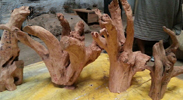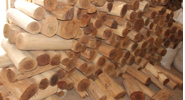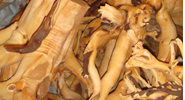|
Sandalwood is the fragrant wood of trees in the
genus Santalum. Species of this tree are found in
southern India, Sri Lanka, Hawaii, South Pacific islands
and Australia. It is used as fragrance in perfume;
incense and for woodworking. Some temples have been
built with sandalwood in India and these retain the
aroma for centuries. Jewelry boxes, fans, and ornate
carvings continue to be made in many parts of Asia,
especially in China & India.
Indian Sandalwood
Santalum Album (Indian sandalwood), is a valuable tree
associated with Indian culture. It is the most valuable
wood in the world. It can be found mostly in the
southern region of India, especially Karnataka, Tamil
Nadu and Kerala. The heartwood
of the tree is treasured for its aroma and is one of the
finest natural materials for carving.
  
Hawaiian Sandalwood
Santalum Paniculatum (Hawaiian sandalwood), were used
and considered high quality of sandalwood and endemic
species to Hawaii island only. This species is found in
dry forest areas on lava substrates or on cinder cones
up to higher elevations in more humid forest, or in
secondary Metrosideros forest from about 450 m to 2550 m
(1480–8360 ft) in elevation. Chinese used the fragrant
heart wood for incense, medicinal purposes, for
architectural details and carved objects.
  
Australian Sandalwood
Santalum Spicatum (Australian sandalwood), It is one
of four species of the family Santalaceae to occur in
Western Australia, which also used by
some aromatherapists and perfumers. Australian
sandalwood is a small tree (up to 4m) that occurs
naturally in the southern half of WA extending south
from the Hamersley Ranges, east beyond the border with
SA and south to the south coast. Natural stands of
sandalwood were common in the Wheat belt before
agricultural clearing, but today the harvesting is
mainly confined to the range lands.
  
Back
|